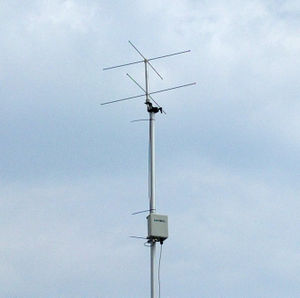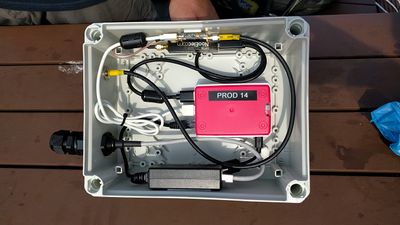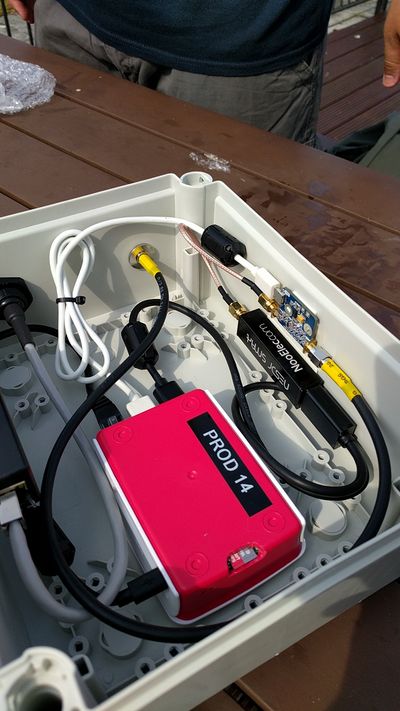Difference between revisions of "No rotator"
From SatNOGS Wiki
(- Remove broken link) (Tag: Visual edit) |
(Tag: Visual edit) |
||
| (3 intermediate revisions by 2 users not shown) | |||
| Line 10: | Line 10: | ||
|documentation= | |documentation= | ||
}} | }} | ||
| + | |||
| + | ==Introduction== | ||
| + | <br /> | ||
| + | |||
| + | {{Message|Warning: Mounting a complete station this close to the antenna (in particular without use of shielding or shielded network cables) can result in the stations performance being significantly limited by its own noise. It is advisable to mount the LNA at the antenna, and the rest of the station as far away as is practicable.}} | ||
| + | |||
No-Rotator ground station uses a static antenna usually in VHF. | No-Rotator ground station uses a static antenna usually in VHF. | ||
| Line 19: | Line 25: | ||
{{Message| Same setup could be used for a ground station with rotator.}} | {{Message| Same setup could be used for a ground station with rotator.}} | ||
| − | =Bill of Materials= | + | ==Bill of Materials== |
The materials are categorized into 4 groups: | The materials are categorized into 4 groups: | ||
| Line 74: | Line 80: | ||
|} | |} | ||
| − | =Assembly | + | ==Assembly Instructions== |
| + | See pictures. | ||
| + | |||
[[File:Liverpool_no_rotator_1.jpeg|400px|thumb|right|Inside the box 1]] | [[File:Liverpool_no_rotator_1.jpeg|400px|thumb|right|Inside the box 1]] | ||
[[File:IMG 20170621 100727.jpg|400px|thumb|right|RF Detail]] | [[File:IMG 20170621 100727.jpg|400px|thumb|right|RF Detail]] | ||
| + | ==Operation== | ||
| − | + | Follow the instructions for setting up the [[Raspberry_Pi|Raspberry Pi 3]] to setup your station. | |
| + | Then consult the [[Operation]] page for getting started on our Network. | ||
| − | + | [[Category:Build]] | |
| − | + | [[Category:Hardware]] | |
Latest revision as of 09:25, 7 November 2020
| No-Rotator | |
|---|---|
| Information | |
| Type: | No-Rotator ground station for SatNOGS network. |
| Cost: | |
| Release Information | |
| Status: | Working |
| Latest Release: | [ ] |
| Repository: | [] |
| Documentation: | [] |
Introduction
No-Rotator ground station uses a static antenna usually in VHF.
A Turnstile antenna that tunes at ~137MHz is used for NOAA satellites.
Some Turnstile antenna design, are wide enough to receive VHF band at 144 - 146 MHz.
For more vertical satellite passes, UHF Helical antennas receive satellites at 432 - 438 MHz,
e.g. [1]
Bill of Materials
The materials are categorized into 4 groups:
- RF components
- Client components
- Hardware components
- Tools
| Part | Qty | Source | Price per Unit ($) |
| RTL-SDR | 1 | [2] | 21 |
| SMA Male to SMA Male Connector Pigtail Cable | 1 | [3] | 1 |
| LNA with FM-Notch | 1 | [] | 35 |
| RG-58 cable, 2.2m | 1 | [] | - |
| SMA Male cable connector | 1 | [] | - |
| Type-N Female chassis connector | 1 | [] | - |
| Type-N Male cable connector | 2 | [] | - |
| Turnstile antenna with Type-N Female connector | 1 | [] | - |
| Raspberry Pi 3 - Model B | 1 | [4] | 40 |
| Raspberry Pi 3 Case | 1 | [5] | 5 |
| SD Card, Class 10, 32GB, Kingston, Sandisk | 1 | [6] | 10 |
| Micro USB Active POE Splitter Power for Raspberry pi 3 Board (48V to 5V 2.4A) | 1 | [7] | 12 |
| POE-48-24W-BULK POE Adapter 48V, 0.5A, 24W | 1 | [8] | 13 |
| Ethernet LAN RJ45 Outdoor Waterproof Connector | 1 | [9] | 3.6 |
| Cable, Male USB-Micro to Male USB-A, L=25cm | 1 | [] | 1 |
| Cable, Female USB-A to Male USB-A, L=25cm | 1 | [] | 1 |
| Ring Core Ferrite Bead for USB cables | 2 | [10] | 0.8 |
| Ethernet cable, outdoor, CAT5 or higher, L=?m | 1 | [] | |
| 1 | [] |
Assembly Instructions
See pictures.
Operation
Follow the instructions for setting up the Raspberry Pi 3 to setup your station. Then consult the Operation page for getting started on our Network.


